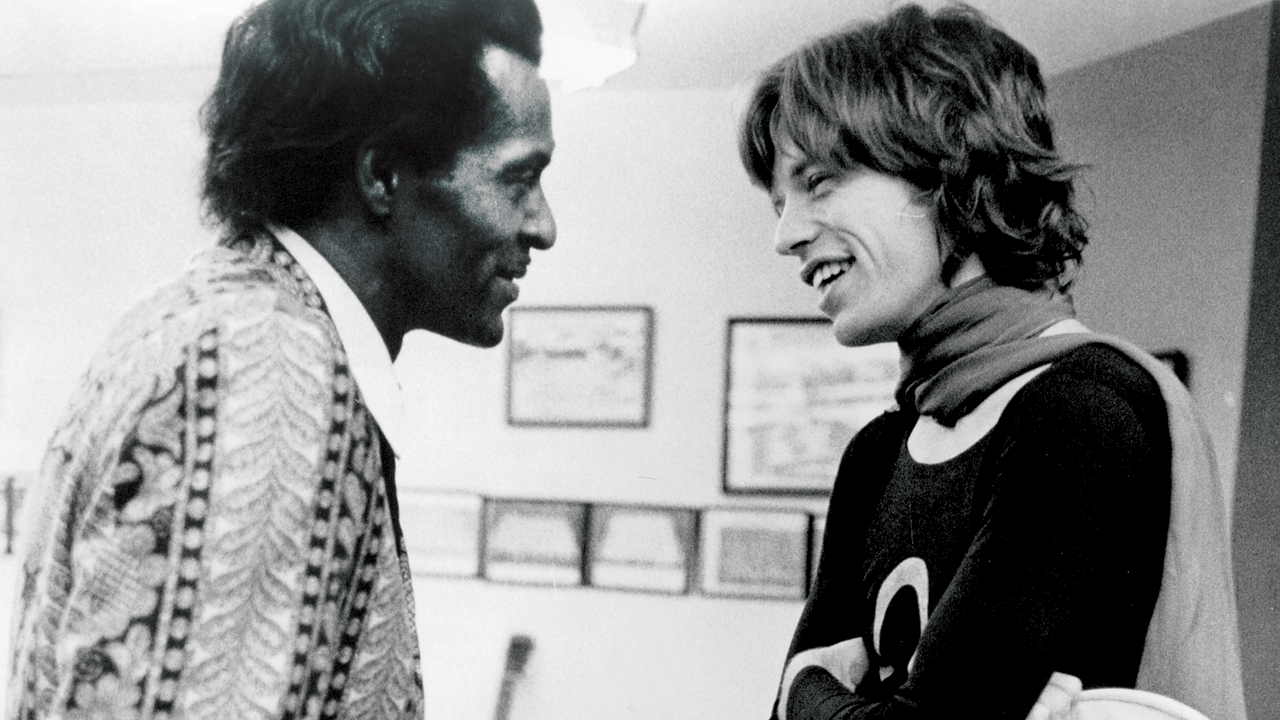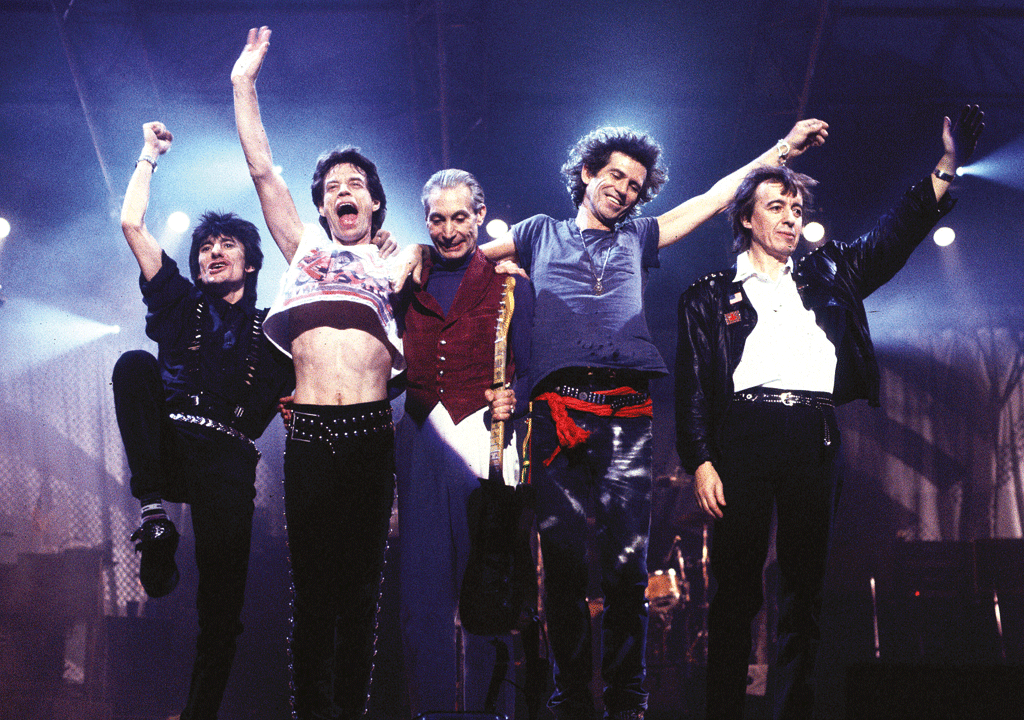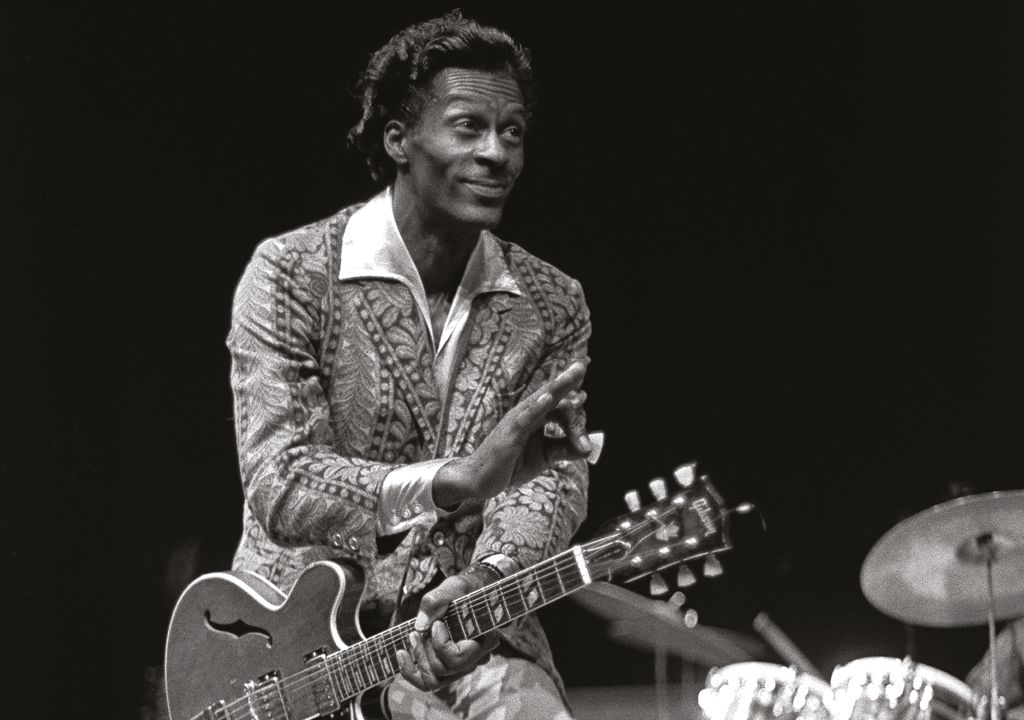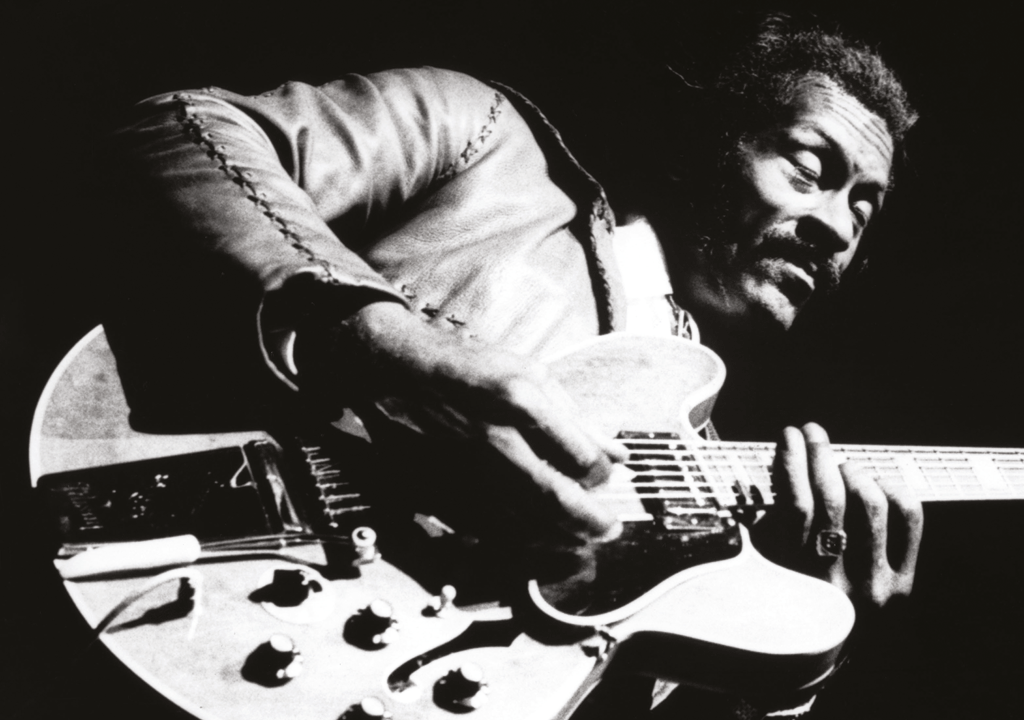Cuttin' Heads: Chuck Berry battles The Rolling Stones
The poet laureate of rock’n’roll Chuck Berry takes on Jagger, Richards, Jones, Wyman and Watts on the R&B song that set the Stones rolling... Come On!

Come On was the first single by The Rolling Stones, which is enough to seal its place in the history books right there. The band, who were about to become known as the bad boys of the British beat boom, released the record in June 1963 in the UK, where it reached No.21 in the chart. The song was written by Chuck Berry who released it as a single himself in the US in October 1961, where it failed to chart (although the b-side, Go, Go, Go reached No.38). It was Berry’s last release before he was sent to prison for 20 months for transporting a 14-year-old girl across state lines for “immoral purposes”, a conviction which earned him more than enough of a bad boy reputation of his own.
The Rolling Stones had been groomed and marketed by their young manager Andrew Loog Oldham as London’s uncouth answer to the Merseybeat sound of The Beatles. The rivalry began when the Stones signed a recording contract with Decca Records in 1963, just seven months after The Beatles had released their first single Love Me Do. But whereas John Lennon and Paul McCartney had written all three of The Beatles’ singles (and b-sides) released up to that point, the Stones had no such songwriting partnership within their ranks to fall back on – as yet. Instead, the band’s live repertoire had been plundered from a rich vein of American blues and R&B songs known only to a small circle of music insiders and devotees. The setlist from the Stones’ first gig at London’s Marquee Club on July 12, 1962 featured customised versions of songs by Robert Johnson, Muddy Waters, Elmore James, Bo Diddley and no fewer than six titles by Jimmy Reed. Most of the Stones’ fans were unlikely to have heard the original versions of these songs and were only dimly aware of the artists who had written them; indeed, it was part of the group’s mission in those early days to popularise the music of the great blues artists that Mick Jagger, Keith Richards and Brian Jones idolised. Even so, it is strange now to think that, for all their youthful brio and revolutionary appeal, the Stones were essentially a blues covers band.
Of all the acts they admired, none exerted a more powerful or enduring influence on the Stones than Berry. The group recorded at least 13 of his songs for official release over the years and covered many others live. More significantly, they imported so many of his trademarks into their own style of playing, singing and songwriting, that you could argue that if anybody invented The Rolling Stones it was Chuck Berry.
Even so, Come On was a curious choice for the band’s first single. The instrumental style of the song occupied a space well outside Berry’s comfort zone. Instead of the familiar, heraldic double-string guitar bends and little-finger rocking back-and-forth rhythm playing of his most famous tunes – Johnny B Goode, Roll Over Beethoven and others – Berry’s version of Come On featured a strange, moaning saxophone line played by LC Davis and a skittish piano part by Johnnie Johnson, woven around a rumba rhythm guided by the drumming of Ebby Harding. Berry’s guitar solo, half way through, was a disorganised and strangely muted affair which set off with a couple of awkward, minor key licks mounted in tandem with some tinkling piano fills. The solo ran out of steam just as the rhythm track came to one of several dead stops that punctuated the arrangement of the song as a whole.
The Stones’ version stripped away all rhythmic ambiguities, replacing Berry’s vague nod in a Latin direction with Bill Wyman’s hard, pedalling Britpop bassline, and ditching the distressed saxophone in favour of a blues-wailing, Dartford-delta harmonica part supplied with an edgy flourish by Brian Jones. The tempo of the Stones version was faster and the mood altogether more urgent than the Berry version, as Richards added a minimalist, chopping guitar part and the song quickly gathered momentum.

At the end of the second chorus the Stones wisely sidestepped the guitar solo and instead reprised the harmonica-led intro, which they used to facilitate a half-step key change (from F to F#) before the final verse. The use of this device has long divided opinion over the Stones’ version of the song. Changing the key before the last verse (or modulation, as it is known) is an old Tin Pan Alley trick which tends to sound cynical and cheesy to ears attuned to modern music.
And so while you might be braced for such a grinding key change to occur towards the end of a big MOR ballad or the theme from a stage musical, it is a move which is rarely granted houseroom in rock’n’roll, let alone blues music. But there was something oddly compelling about the Stones’ use of it here. The song, which lasted less than two minutes, was a model of lean economy, and in this setting the key change underlined the mounting sense of impatience conveyed both in the lyric and by the tautness of the band’s overall delivery. Rather than being a corny way of fishing for a Pavlovian response from the listener, here the key change worked more like a ratchet turning up the dial another notch on a pressure cooker.
Sign up below to get the latest from Classic Rock, plus exclusive special offers, direct to your inbox!
The Stones piled into the final verse and then closed out the song with a double chorus and a neat harmonica-driven outro. Berry’s version, however, fizzled out in a half- hearted fade, part way through the final chorus. Whether by accident or design, both records timed out at exactly 1.48. But the Stones version boasted nimbler footwork and packed a much harder punch than Berry’s. With the American heavyweight more reeling than rocking at this point, round one in the contest goes to the young London welterweights.

Berry’s playing style and technique inspired the careers of many guitarists, including one K Richards from Dartford, Kent, but he was no less revered for his skill as a lyric writer – a talent which earned him the soubriquet the poet laureate of rock’n’roll. Come On was a typically adroit narrative that managed to compress feelings of frustration, irritation and romantic yearning into a quick, three-verse rumble with a nonchalant dash of irreverent wit and bolshy exuberance. The singer in the song has split up with his girlfriend and has been out of sorts ever since. His car has broken down, he’s laid off from his job and he can’t afford to check it… ‘I wish somebody’d come along and run into it and wreck it.’
Berry sang the song in a deadpan tone, tinged with a dry sense of resignation. There was a neat flatlining harmony in the chorus which, according to the sleeve notes on the compilation album _The Great _Twenty-Eight, was sung by one Martha Berry – a vocalist who has remained uncredited on any other recordings before or since, and who happened to share the name of Berry’s mother.
But although Berry, together with his mysterious backing vocalist, sang the song with the cool authority you would expect from its author, Jagger and the Stones turned Come On into a calling card for a whole new pop sensibility. Mick Jagger’s delivery, both bullish and disaffected at the same time, offered an insight into a young man’s frustrations which may have been commonplace in the world of American blues, but which hadn’t been heard before in the British pop charts.
The Stones made it a calling card for a new pop sensibility.
To make sure the song was heard in the pop charts, there had been a slight watering down of Berry’s lyric, such that the “stupid jerk” at the other end of the phone line in Berry’s version became a “stupid guy” in the Stones’ take (this was, of course, still the more innocent days of the early 1960s). And the mono production of the record, by manager Andrew Loog Oldham, had distinct echoes of the fashionable Merseybeat sound – although you would have to wonder how much Oldham actually had to do with that direction, given his apparent surprise at the end of the recording session to discover that it was customary to then mix the track before sending it to the pressing plant and committing it to vinyl.
Yet even with these (small) compromises, Come On, could hardly have been bettered as a number with which to introduce The Rolling Stones to the world as the loutish yang to The Beatles’ cheerful moptop yin. With the nation caught in the grip of Beatlemania and the charts bathed in the emollient glow of Please Please Me and From Me To You, the Stones stepped into the ring with a look, an attitude and most importantly a song that took a way more truculent line.

First reactions to the Stones singing Come On were later echoed in early sightings of acts such as David Bowie or even the Sex Pistols. For their TV debut on the show Thank Your Lucky Stars, on July 7 1963, the Stones came on in a uniform of houndstooth jackets, black trousers and shiny new Beatle boots, but still managed to look unruly and unkempt compared to the other “lucky” stars on the show. They were treated with ill-concealed disdain by the programme’s compere Pete Murray, and a fight almost broke out in the Birmingham studio beforehand with an Irish showband called Eileen Reid And The Cadets, whom Richards hailed as “the Irish fucking navy” as he walked past them. By the time the Stones had finished singing (or miming to) Come On, the pop world had acquired a new gang of black sheep.
Come On was a harbinger of the style which Jagger evolved in the songs he later went on to write with Richards.
(I Can’t Get No) Satisfaction, Get Off Of My Cloud, Mother’s Little Helper, The Last Time and many others all bore clear echoes of Berry’s sly, observational wit and knockabout attitude, while even the way Jagger scanned his lines in later songs such as Brown Sugar was clearly influenced by Berry.
Berry, who was 35 years old when his version of Come On was released, was clearly the superior performer in terms of experience and stagecraft – and he was the one who wrote the song, when all is said and done. But Jagger, aged 20 at the time he sang the Stones version, added youthful swagger and his trademark sneer to the lyric, while the Stones invested the song with a new, urgent dynamic and a fresh sense of purpose that signposted the road ahead. A victory for the Limeys on points.
Musician since the 1970s and music writer since the 1980s. Pop and rock correspondent of The Times of London (1985-2015) and columnist in Rolling Stone and Billboard magazines. Contributor to Q magazine, Kerrang!, Mojo, The Guardian, The Independent, The Telegraph, et al. Formerly drummer in TV Smith’s Explorers, London Zoo, Laughing Sam’s Dice and others. Currently singer, songwriter and guitarist with the David Sinclair Four (DS4). His sixth album as bandleader, Apropos Blues, is released 2 September 2022 on Critical Discs/Proper.

